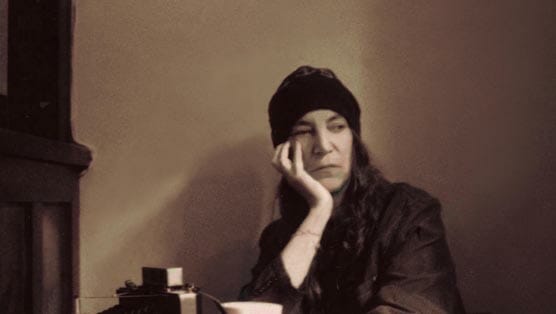M Train by Patti Smith

Unfolding from the hazy edges of a dream, Patti Smith’s M Train is a memoir that blends a lifetime of scattered memories with the small, comfortable routines of every day experience.
While Smith’s 2010 National Book Award-winning Just Kids was a tender and intimate portrait of two artists coming into their own, this follow up eschews conventions. M Train moves in several arcs at once, fading in and out of dreams, jumping between subjects and years like a stone skipped across a lake.
 This more experimental memoir aligns with Smith’s balanced artistic halves, the poetry and the punk rock. M Train contains elements of manifesto, passionate tributes to the writers she reveres, accounts of some of Smith’s stranger travels and vivid passages of her continual search for artistic inspiration. At 66 (now 68), memory and love weigh heavily on Smith’s mind as she writes. Here, she’s sectioned her work off in “stations” rather than chapters, the disjointed times and places also emphasizing the strongest connections in her life.
This more experimental memoir aligns with Smith’s balanced artistic halves, the poetry and the punk rock. M Train contains elements of manifesto, passionate tributes to the writers she reveres, accounts of some of Smith’s stranger travels and vivid passages of her continual search for artistic inspiration. At 66 (now 68), memory and love weigh heavily on Smith’s mind as she writes. Here, she’s sectioned her work off in “stations” rather than chapters, the disjointed times and places also emphasizing the strongest connections in her life.
At one level is the present for Smith, roughly a year and a half of a particularly difficult period. She writes of feeling off-balance and lethargic, overcome by malaise, bound otherwise by the simple daily routines of her café, her black coffee and her brown toast. Cafés are one of Smith’s greatest loves, from her first moments in New York in 1965, owing to a youthful romanticism bound up in Arthur Rimbaud and the Beats, and she lists favorites across the world: from Paris and Sydney to Uppsala and Tucson.
In this narrative of the present, different projects bring Smith to Berlin, Mexico City, Tokyo and Tangiers, those travels interspersed with memories of past trips: collecting rocks from a long-closed prison in French Guiana, singing Buddy Holly songs with reclusive chess champion Bobby Fischer in Iceland and visiting Jim Morrison’s grave in Paris and Sylvia Plath’s grave in West Yorkshire.
These impressionistic vignettes are more lyrical than Smith’s earnest and direct prose in Just Kids, and they cover a broader portion of her life. She writes of meeting her husband Fred Sonic Smith in Detroit, an unexpected connection that altered the course of her life. “My yearning for him permeated everything—my poems, my songs, my heart.” The relationship hinges on the “common mind” they shared and Smith is at her most heartbreakingly direct in describing his funeral, where she sings “What a Wonderful World” a cappella.
Like in Just Kids, Smith is eager and earnest in relating her lifelong reverence for the writers who inspired her: Rimbaud, Jean Genet, Henrik Ibsen and unexpected contemporary favorites like Haruki Murakami and Henning Mankell. “I offer my world on a platter filled with allusions,” she writes.
-

-

-

-

-

-

-

-

-

-

-

-

-

-

-

-

-

-

-

-

-

-

-

-

-

-

-

-

-

-

-

-

-

-

-

-

-

-

-

-








































